
This article is part of the network’s archive of useful research information. This article is closed to new comments due to inactivity. We welcome new content which can be done by submitting an article for review or take part in discussions in an open topic or submit a blog post to take your discussions online.
These documents are archived. Please see the ISARIC generic SARI protocol for updated versions.
Disclamier
Ethical and/or other appropriate approval as perscribed nationally, regionally or locally may be required before using the CRF and any supporting documents. Such approval must be obtained before data collected using the CRF is submitted. Please liaise with your national public health agencies.
This is the ISARIC case-report form if you wish to use it for cases of human infection with the novel coronavirus (hCoV-EMC) including all patients under investigation and probable cases as per WHO case definitions, which can change (http://www.who.int/csr/disease/coronavirus_infections/case_definition/en/index.html). It has been assembled by ISARIC members on the basis of the WHO natural history protocol, INFINITE (ANZICS), MOSAIC and others. We hope that by providing this first series of documents that we can work towards standardising data.
Please remember to involve your public health agencies in any of this work, as the results may have public health significance and you will want to avoid any duplication of data collection.
It is a basic CRF with the aim to be applicable to all resource settings. The idea is to fill in the CRF at admission (or first contact) and at discharge (or last contact) and to gather the basic information about the cases. Some may wish to complete what they can of it when they retrospectively test stored samples. This CRF will be accompanied by an appendix explaining abbreviations etc. further.
Please also see the daily CRF for higher resource settings in order to gather additional information about the course of the disease, published alongside a CRF for supplementary data. We are aware that this basic CRF is already complex and tries to be comprehensive. We’d like to encourage colleagues to use it even if only scarce information is available.
This CRF is work in progress and we are happy to get feedback and comments. Please send feedback via the ISARIC secretariat at kajsa-stina.longuere [at] ndm.ox.ac.uk or gail.carson [at] ndm.ox.ac.uk
In addition to this CRF and the mentioned daily CRF we are working on additional CRF modules including paediatrics, radiology and laboratory results. These will be made into e-CRFs with an accompanying database.
Useful Resources
- ISARIC Novel Coronavirus CRF Version 1.3 15MAR13 198.7 KB
- ISARIC Nover Coronavirus Daily Record Form 15MAR13 135.7 KB
- ISARIC Novel Coronavirus Supplementary Data Form 15MAR13 108.6 KB
Related Articles
-
Institutional maternal and perinatal deaths: a review of 40 low and middle income countries
BY Bailey et al -
Zika virus in asymptomatic blood donors in Martinique
BY Gallian et al. -
Antimicrobial Resistance and Immunisation
BY Authors: Sarah Bunn; Catherine Hall -
Biological Informatics Research Training in Health
BY M. Lesosky, C. Reddy -
The International Stroke Trial database
BY Peter AG Sandercock, Maciej Niewada, Anna Członkowska, the International Stroke Trial Collaborative Group